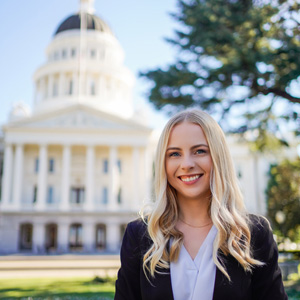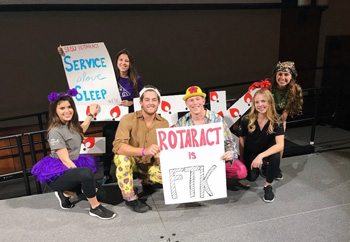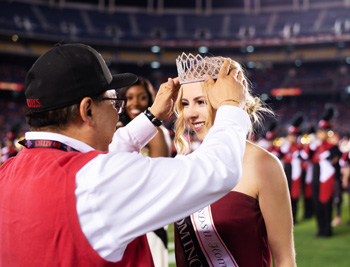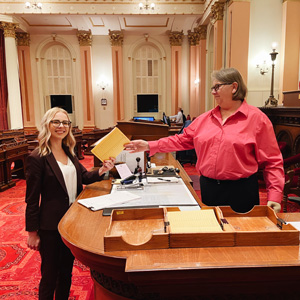SDSU Alumna Serves Others Through California Senate Fellowship

Anya Shutovska (Management, ‘19)
San Diego State University alumna Anya Shutovska (Management, ‘19) realized her personal mission for serving others during her time as a student leader. Her diverse range of campus involvements including the Fowler Scholars Program, Associated Students, Rotaract, the Educational Opportunity Program, and more, inspired her to pursue a career in public service after graduation in May 2019.
Shutovska was accepted into the Capital Fellows Program, where she served as a primary staffer in Senator Hannah-Beth Jackson’s office and worked on policy areas such as health, human services, and elections. Since her fellowship ended last fall, Shutovska has continued her career in public service working as an analyst in the legislative office at the California Health and Human Services Agency. Shutovska shares how her Fowler College of Business degree and experiences as a student leader helped her succeed in her career. Additionally, she offers advice for students seeking ways to get involved in campus opportunities, internships, and fellowships.
Background and SDSU Journey
Name: Anya Shutovska
Major (and minor): Bachelor of Science in Business Administration Management and a Marketing minor (May 2019).
Former campus affiliations / organizations:
-
Fowler College of Business
- Inaugural Fowler Scholar
- Peer Advisor in the Fowler Center for Student Success
- Founder and President of Beta Gamma Sigma
- Inaugural Recipient of the “Lang Lecture Series Student Award for Outstanding Ethical Leadership”
- Studied abroad through the College of Business in Berlin, Germany
-
Student Organizations
- Associated Students
- Rotaract
- Dance Marathon
- Mortar Board honor society
- Educational Opportunity Program
Q: Where are you from?
I was born in a small town in Ukraine and immigrated to the San Francisco Peninsula Bay Area in elementary school, which is where I was primarily raised.
Q: Why did you choose to attend San Diego State University?
When I was applying to college, I learned that I qualified for a couple of application fee waivers so I randomly picked four state universities with business programs. Ultimately, I chose SDSU because of the value for the price. As a first-generation student paying for college on my own, it was important for me to attend a university that was not only affordable but also one where I would receive a high quality education. The California State University system, notably the largest four-year public university system in the United States, offered me the resources that I needed to succeed. Additionally, I read that San Diego State had a reputable business program and was known for its school spirit. I wanted to attend a university where I could do more than just attend class and could get involved in student organizations. At the time, one of SDSU’s slogans was “Leadership Starts Here.” Funnily enough, the slogan alone was also a big factor in my decision.
Q: Why did you choose to get a degree from the Fowler College of Business and how has your business degree prepared you for your career?
I felt that the Management program in the Fowler College of Business would teach me skills that would be transferable to any field I decided to pursue. However, at first I was not sure if I would find opportunities to apply my degree when I began working in the legislature and for the State of California. It is a different environment than what Fowler typically prepares you for. But in situations where I am negotiating changes to legislation or needing to think strategically to resolve a problem, I find myself reflecting on my finance, negotiation, and human resources coursework often. The Fowler College of Business is also unique because it places a significant emphasis on ethical leadership and teaches you how to put yourself in someone else’s shoes. While I originally learned those concepts to, for example, market products or negotiate contracts, I have been able to adapt the lessons to every job I have had post-graduation just as I had hoped.

Shutovska poses for a photo at the 2017 Dance Marathon event with the leadership team and Rotaract SDSU members.
Q: As a student leader who was involved in many organizations at SDSU, can you share which organizations had the greatest impact on your college experience and career choice? What made you decide to start your career in public service instead of the private sector?
My four years in Associated Students and SDSU Rotaract were the most enjoyable and impactful involvements I had. It was in these organizations where for the first time I met people who experienced upbringings similar to mine and not only overcame their personal challenges, but became student leaders advocating for change, whether that was by creating the first student food pantry in A.S or hosting a fundraiser for wildfire victims in Rotaract. My peers showed me that I had not only the ability, but a responsibility, to do the same. Thus, I began to channel my background and passions into helping others who have experienced hardships and taking up new social causes to be a voice for others. At the same time, I had several internships that allowed me to experience the different paths I could pursue. Through this, I realized a latent personal mission for serving others that I never knew was there before. Yet, it was not until my last year of college that I began to consider making a life-long career out of it. I was offered a position at a reputable company post-graduation but when I was accepted in the Capital Fellows Program, which would allow me to work on public policy on behalf of Californians, I knew I had to seize the opportunity and I am so glad that I did.
Q: What is your favorite memory from SDSU?
I was blessed with many incredible moments at SDSU, but the first one that comes to mind is when I was selected as a Homecoming Royal during my senior year in recognition of my contributions and involvement on campus. It caught me by surprise since I was in the running with several of my equally qualified friends. But the best part was having my mom there with me. I don’t think she ever could have imagined when she chose to immigrate to the United States that her daughter would graduate from college with this kind of an honor. I saw the award as more for her than for me. I would not be who I am without the sacrifices my mom has made for me.
Q: What accomplishment from your college career are you most proud of?

Shutovska received the Homecoming Royal award in 2018.
I am most proud of the relationships I built at SDSU, which has now turned into a supportive group of friends and an alumni network that I can call upon for advice. I am also very appreciative of the opportunities I had to mentor younger students and now seeing them doing so for others.
Q: What advice would you give students wanting to get involved at SDSU?
Even though it can be uncomfortable and intimidating, you never know where one simple decision to get involved will take you. If I had not joined Associated Students six years ago, I probably would not have gotten involved with Rotaract, Dance Marathon, and the Fowler Center for Student Success. If I didn’t organize community service events or fundraise For The Kids, I would not have met my friends and mentors who told me about the job opportunities in public service. Ultimately, I likely wouldn’t have known about the Capital Fellows Program or been accepted into it without these experiences. Completing the Fellowship has led me to working as an Analyst in the California Health and Human Services Agency, the entity that administers many of the programs I benefited from growing up. It may sound cheesy, but if an event or organization sparks your interest, do it! You have nothing to lose and it might just be the best decision you ever make.
Q: How did being a Fowler Scholar impact your college experience? What does being a Fowler Scholar mean to you?
My student government teacher in high school instilled in me the importance of integrity, which is very similar to ethics. Therefore, when the Fowler College of Business Dean told me about how they were starting a new program called the Fowler Scholars to focus on ethical leadership and invited me to be a part of it I immediately said yes. This was during my last year at SDSU so it has been great to watch the program grow into what it is today. To me, being a Fowler Scholar means recognizing the responsibility each of us has to create businesses and organizations that are ethical and innovative in their approach to solving society’s toughest challenges.
California Senate Fellowship
Q: What is the Capital Fellows Program?
The Capital Fellows Programs are nationally recognized public policy fellowships which offer unique experiences in policy-making and development in each branch of government. Capital Fellows are placed at some of the highest levels of California state government and assist state legislators, senior-level executive staff, and court administrators. They support a broad range of public policy issues, projects, and are typically given assignments with a significant amount of responsibility. Last Fall, I completed the Senate Fellowship.
Q: When did you complete this fellowship and how did you hear about the opportunity?
Originally, I heard about the opportunity from my advisor in Associated Students who also helped me with the application. I went to a Capital Fellows workshop and spoke to faculty and staff in the Political Science Department (College of Professional Studies and Fine Arts). Both places are also great campus resources for the program because they can connect you with former Fellows who will be glad to assist anyone with the application process.

Shutovska on the Senate Floor officially introducing one of Senator Jackson's first bills in the 2019-2020 legislative session.
Q: Please describe your day-to-day duties and responsibilities as a Senate Fellow.
I spent the first six weeks of the Senate Fellowship being trained on the policy making process and how to be an effective legislative staffer in the California State Senate. Subsequently, I began working in Senator Hannah-Beth Jackson’s office where I served as the primary staffer on policy areas such as health, human services, and elections, and was responsible for moving several of the Senator’s bills through the legislative process. On any given day, you could find me negotiating bill amendments with stakeholders, meeting with organizations on their legislative priorities, drafting communications materials, briefing Senator Jackson, and more.
Q: What skills did you have going into the fellowship and how did this fellowship help you build on those skills or gain new ones? Why do you believe fellowships/internships are valuable for SDSU students?
I had already begun to gain teamwork, problem solving, and analytical skills in the student organizations and internships that I was a part of in college. Once I began learning more about the political process during the Fellowship, I realized that what I did in those involvements was a microcosm of what happens in the State Capitol. This helped me grasp things fairly quickly and prepared me to continue learning and honing skills in a more high stakes environment. I think that this is the same in any job and speaks to the importance of pursuing extracurriculars but also formal fellowships and internships where you can gain experience that will make the transition to post-grad significantly easier.
Q: What challenges did you face during your fellowship and how did you overcome these challenges? Is there an accomplishment from your Senate fellowship that you are most proud of?
The most challenging part of the fellowship was the transition to working remotely six months into the program due to the COVID-19 pandemic. We also had to shift our policy priorities to addressing the many ways this virus has upended normal life. Luckily, by the time we moved to teleworking in March I had the tools and knowledge I needed to transition as seamlessly as one can during such unprecedented times. The legislature had to quickly adapt the way we did things and a lot of the new procedures were created along the way. Despite the challenges, I am proud that I was able to work on two bills that got all the way to the Governor’s desk. One of them, which went into effect at the start of 2021, has expanded access to paid family leave. Now, more employees are able to take necessary time off of work to care for their loved ones. The other bill focused on protecting vulnerable skilled nursing facility residents during public safety power shut off (PSPS) events in emergency situations, such as wildfires.
Q: What advice do you have for students seeking internships/fellowships?
My number one piece of advice is to not self-select yourself out. If you see an internship or a fellowship that you are interested in but you feel that you don’t meet every requirement or it is too competitive, apply anyway! You never know what kind of person the selection panel is looking for. Many of my peers have been offered positions they had thought were a stretch because they impressed the interview panel or had valuable experience the organization didn’t know they needed.
Q: Who were your greatest mentors throughout the fellowship?
I had so many great mentors, but I have to mention Jamie Taylor and McKinley Thompson-Morley. Jamie is the Director of the Senate Fellowship program and also a San Diego State University alum who was involved with Associated Students. McKinley was a Senate Fellow the year before me and another SDSU alum. It was easy for me to connect with them off the bat about our time on campus, and both of them helped me transition to Sacramento and learn the best practices of legislative work.
*All group photos were taken before March 2020

